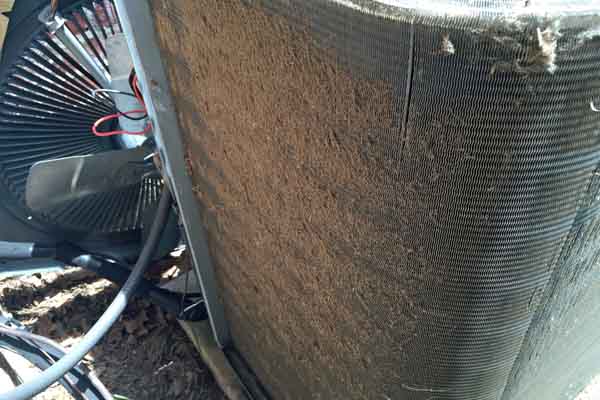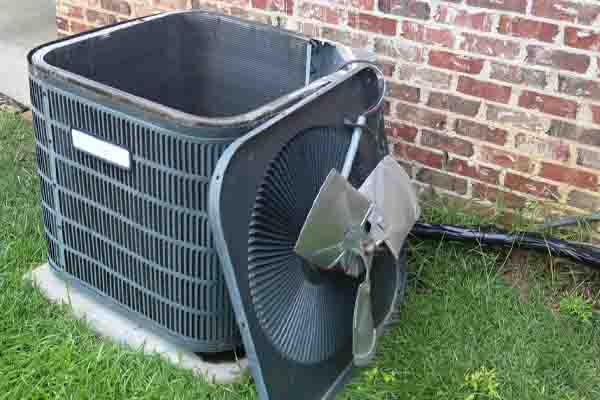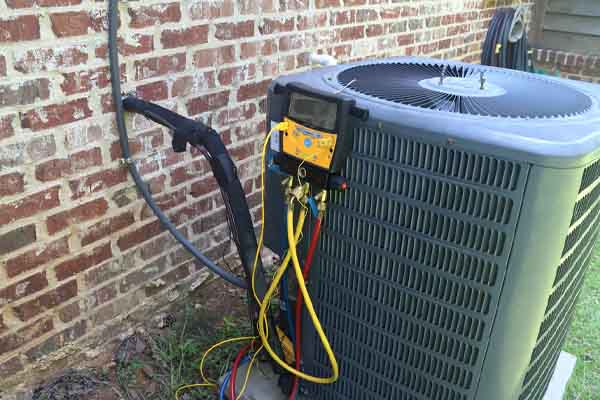Contents
All air conditioners emit some noise. This includes new units, which generate specific sounds that are completely normal for daily use. In most cases, the noises are because of the system’s normal operation, so there is nothing to worry about. However, there are times when an air conditioner making noise is due to a significant issue that a professional HVAC technician should check right away. Noises are typically a sign that parts aren’t working properly and an air conditioner that is not functioning as it should.
What Air Conditioner Noises Should I Watch Out For?
Modern air conditioners emit much less noise than older ones. Advancements in HVAC technology have resulted in many models being equipped with noise-dampening technology with variable-speed compressors. This results in air conditioners producing sounds at 55dB or less, the same noise level a standard dishwasher generates. A problematic air conditioner is likely to make the following sounds:
Related Article: Top 7 Things You Should Never Do To Your AC Unit
AC Unit Is Buzzing

A buzzing air conditioner may be due to an electrical issue or loose or unbalanced fan blades in the outdoor unit. Other causes for this noise can be dirty condenser coils, other loose components, or a faulty outdoor fan motor. You will also hear a distinct buzzing noise from your air conditioner if it has a refrigerant leak.
Related Article: How A Modulating Air Conditioner Controls Temperature and Humidity More Effectively
Humming Coming From The Air Conditioner
An air conditioner that emits a hum maybe because it has a defective contactor relay switch. The air conditioner may not switch on if this component is malfunctioning. The thermostat signals the contactor relay switch to start the condenser. Only a licensed HVAC technician should handle this electrical issue. In some situations, the humming sounds are because of fan motor problems.
Air Conditioner Clicking
Clicking AC unit sounds are confusing as they sound like your air conditioner does when it starts or ends a cooling cycle. However, a frequent or continuous clicking noise points to a thermostat issue. The thermostat needs a replacement if this is the issue. Ensure that a licensed HVAC technician does this task.
Related Article: How To Avoid Heat Exhaustion & Heat Stroke When Your AC Goes Down
Air Conditioning Screeching Sound

A screeching noise is one of the most distinct sounds a malfunctioning air conditioner produces. The condenser’s fan motor is likely malfunctioning, causing the screeching noise. A fan’s primary function is to remove the heat from the refrigerant. However, a defective fan can result in the air conditioner failing to lower the temperatures inside your home.
A damaged blower fan motor can also cause screeching sounds. Blower fans help eliminate heat and humidity inside, forcing the air to the return ducts where the air conditioner cools it. The blower fan then circulates the cold air through the vents throughout the house.
Other potential causes for your air conditioner’s screeching sounds are a faulty fan belt and defective fan motor bearings. All of the issues listed above require the attention of an HVAC technician.
Air Conditioner Is Clanking
An air conditioner emitting a noise that sounds as if it has a loose metal part hitting another metal part may need a parts replacement. Unbalanced or loose parts can cause clanking noises. For instance, loose or unbalanced blades in the indoor blower or outdoor fan mean they will hit other parts. Call an HVAC professional if you are experiencing this problem with your air conditioner. Do not let the situation worsen. After all, metal hitting metal can cause more damage and expensive air conditioner repairs.
Related Article: Top Signs of An Overcharged Air Conditioner
A/C Unit Whistling

An air conditioner that produces a whistling or high-pitched sound is due to the high pressure within the compressor. It could also be a refrigerant leak. Only an HVAC technician should handle these severe problems, and they should resolve them as soon as possible. Turn off your air conditioner when either issue happens, and call your local HVAC professional.
Related Article: Tips for Finding A Good Air Conditioner Replacement Company
Cooling System Is Banging
A faulty compressor usually causes banging noises. These noises are relatively common in older AC units. Age and regular wear may cause the air conditioner components to get loose or unfastened. An air conditioner component may also be broken. The possible components are found in the compressor, like the crankshaft, piston pin, or connecting rod. Another reason for the banging noise is an imbalanced indoor blower. You will likely need to replace the compressor if this problem is present.
Whirring Noise From A/C
An air conditioner that sounds like it has a drone or helicopter within it may mean it has a mechanical issue. These include a faulty fan belt, a defective blower fan motor, or a damaged fan. A whirring sound can also be heard if the fan blades are loose. A best-case scenario is when the problem is only due to trapped debris in the outdoor fan unit or indoor blower fan. If you know how a piece of paper sounds when it hits a fan, consider this sound a warning.
Related Article: Signs You Need Better Air Quality At Home
Rattling Coming From Air Conditioner
Loose debris in the outdoor condenser can cause the air conditioner to emit a rattling sound. Some debris that has fallen into the unit may include leaves, twigs, or dirt. This is easy to repair because you only need to open the condenser and remove the debris. If the outdoor unit is clean, the noises may be due to an issue with the AC electrical contractor. This needs to be repaired immediately to keep severe damage from occurring.
Conclusion
Air conditioners that have passed the manufacturer’s quality test and were installed correctly should last for a good 15 years or more as long as it is regularly maintained and reasonably used. However, time eventually catches up with the air conditioner, and it may not work how it used to. Never assume it is a simple problem if you are unsure what to do. Call a reliable HVAC technician so they can find the problem correctly and use the right solutions.
Tevis Energy’s sister company, Modern Comfort, performs HVAC installations, replacements, tune-ups, and more. Our technicians can provide you with expert HVAC services to ensure that your system provides you with the comfort and efficiency you deserve. Call now to schedule an appointment.
Related Article: Ductwork Makes Banging Noise: Causes & Solutions
Call Tevis Energy For All Your HVAC Requirements

Tevis Energy provides high-quality heating and cooling services in central Maryland and southern Pennsylvania. Our professionally certified technicians can provide exceptional HVAC services, like air conditioner tune-ups, mini-split replacements, furnace repairs, and more. Our skilled techs have extensive experience and knowledge to service your HVAC unit correctly.
Our company offers quality and affordable heating and cooling service costs in the area. Our maintenance services can enhance home comfort, indoor air quality, and energy efficiency while reducing cooling expenses. If your heating or cooling unit needs to be replaced or repaired, we can recommend the best home solution within your budget. All of our work is guaranteed, as your satisfaction is important to us. Book a service appointment by calling Tevis Energy today. We offer free, in-home estimates.
You can click here to contact us now or call us at (410) 876-6800 to find out more! Click the link to view our service area.
Posted in Blog
Tags: